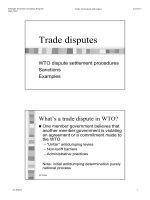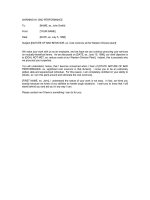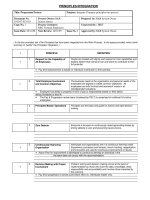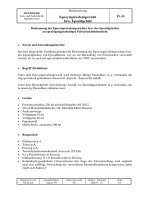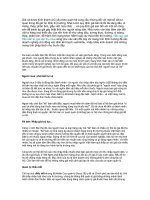Tài liệu Analyse career pptx
Bạn đang xem bản rút gọn của tài liệu. Xem và tải ngay bản đầy đủ của tài liệu tại đây (135.83 KB, 8 trang )
Includes the following assessments: Entrepreneurial index, Occupational Interest, Personality and
Aptitude Assessments.
Aptitude Tests
There are several different tests, which uniquely identify your aptitude ability: numerical
reasoning, mechanical reasoning, abstract reasoning, spatial relations, verbal reasoning,
language usage and spelling.
Personality Test
This assessment identifies your personality type. Are you an introvert or an extrovert, sensate or
intuitive, are you the thinking or feeling type and what is your perception versus your judgement.
Occupational Interest
The Occupational Interest assessment identifies the type of career interests that you have. Our
system develops this career profile by presenting you with different types of careers, which you
must rank in order of your preference.
Entrepreneurial Index
The Entrepreneurial Index evaluates your level of entrepreneurial orientation. 10 different scales,
developed by Dr. C Lankford, measure your cognitive and non-cognitive skills. Detailed reports,
draw analogies between your mindset and those of leading entrepreneurs.
Aptitude Tests
There are several different tests, which uniquely identify your aptitude ability: numerical reasoning,
mechanical reasoning, abstract reasoning, spatial relations, verbal reasoning, language usage and
spelling. On completion of each aptitude assessment, you will be given a detailed career guidance
report and a description of careers, which are suitable to your aptitude abilities.
Mechanical Reasoning
This tests your ability to understand the
underlying principles behind machines.
High scores in this test indicate
proficiency in engineering and
mechanical work. The test is concerned
Spatial Relations
This test is probably the most difficult
one in the series. It reflects an ability to
deal with mathematical concepts at a
high level. When taken in conjunction
with the mechanical reasoning test, a
with whether you can reason through
mechanical problems in a logical way
and is, therefore, a useful way of
measuring a person's mechanical
aptitude. If you get a high score in this
test, in space relations and abstract
reasoning, you could give serious
consideration to scientific, mathematical
or technological subjects and careers.
Do Test
high score in both indicates that you
should probably pursue technological or
scientific careers. Space relations
involves the ability to visualise and think
in three dimensions or picture mentally
the shape, the size and positions of
objects when shown only a picture or
pattern.
Do Test
Abstract Reasoning
This aptitude has to do with your ability
to reason with visual configurations. The
questions in this assessment contain
patterns and series, which have to be
completed. They are a non-verbal
measure of reasoning ability and as such
are regarded by many occupational
psychologists as a good measure of raw
intelligence. The kinds of skills that this
aptitude identifies are useful in
architecture, design, draughting and
computerisation such as CAD (Computer
Aided Design)
Do Test
Language Usage
Language usage is the ability to
communicate in good, accurate
grammatical English. It is a measure of
how well one can distinguish between
correct and incorrect grammar,
punctuation and wording of sentences. It
is an excellent predictor of performance
in College Courses. While such careers
as writing and teaching require
especially developed language skills,
nearly all kinds of work requiring College
Education demand a considerable
competence in this aptitude.
Do Test
Spelling
Spelling is an important skill in school,
college work, and in many jobs. Among
other things, this score is one of the best
predictors of the ease and speed with
which one can learn typing and
shorthand. While poor spellings need not
necessarily be an indication of a poor
level of education, it is certainly regarded
as a pre requisite for careers such as
journalism, insurance and teaching.
Verbal Reasoning
Verbal reasoning refers to your ability to
reason logically in verbal terms. It refers
to your ability to comprehend verbal
concepts or ideas and to see the
relationships between them. The careers
in which this aptitude is particularly
helpful are Law, Psychology, Personnel
and different types of management.
Do Test
Do Test
Numerical Ability
This aptitude refers to your ability to add,
subtract, multiply and divide. It is an
aptitude that is useful in careers such as
accounting, banking, insurance and
engineering disciplines.
Personality Assessment
Know your own Personality - Discover your personality type.
This personality test is based on the typologies that were identified by Carol Jung. He identified
different personality typologies and subsequent researchers developed 16 personality types from his
original work. These types are based on the following polarities:
Extrovert (E) versus Introvert (I)
Sensory (S) versus Intuitive (N)
Thinking (T) versus Feeling (F)
Perception (P) versus Judgment (J)
This assessment identifies your personality type. Find out your true nature - Are you an introvert or an
extrovert, sensate or intuitive, are you the thinking or feeling type and what is your perception versus
your judgment?
On completion of this assessment, you will be provided with a report, which answers these questions.
Careers matching your personality profile will also be described in detail.
The table below gives a brief outline of what each personality type signifies. The AnalyzeMyCareer
assessment identifies which of these categories you belong to and provides a detailed description of
what it means to have such a personality.
Extraversion Types
Introversion Types
ESFJ Personality Type
As well as being directed towards external
phenomena you are responsive to sensory,
feeling and organizational factors.
Counselors, child care, social workers
ISFJ Personality Type
You are a well-grounded person who gets on
well with people and deals with everyday
issues in an organized way.
Teachers, health workers, librarians
ESTJ Personality Type
Your personality is strong on thinking as well
as being oriented towards external, sensory
and organizational matters
Financial manager, supervisors
ISTJ Personality Type
As well as having good self-acceptance, you
are reflective, organized and focused on the
world around you.
Accountants, engineers, technicians
ESFP Personality Type
You are good at adjusting to new situations in a
feeling manner as well as being sensitive and
outward directed.
Child care, secretaries, counselors
ISFP Personality Type
You adjust well to new situations and relate
through your feelings. You are responsible and
respond well to sensory factors.
Stock clerks, outdoor workers, painters
ESTP Personality Type
As well as being able to adjust to new
situations you think carefully about your
responses to the world.
Builders, plumbers, carpenters
ISTP Personality Type
You think deeply as you adjust to new
situations, while you are well grounded and
respond to the world in an ongoing way.
Craft workers, statisticians, technicians
ENFJ Personality Type
You are organized, intuitive, outward directed
and rely on feelings a great deal.
Counselors, teachers, home economists
INFJ Personality Type
Your intuitions go hand in hand with your self-
acceptance. You are strong on the feeling and
organizational dimensions.
Psychiatrists, teachers, writers
ENTJ Personality Type
As well as being an intuitive, and organized
person with an orientation towards the world
you make thoughtful decisions.
Lawyers, managers, operations research
INTJ Personality Type
Thoughtful reflections, intuition, organized
strategies and autonomy are key dimensions to
your personality orientation.
Engineers, scientists, social scientists
ENFP Personality Type
You are an intuitive, feeling, perceptive person
who is orientated towards the world around
you.
INFP Personality Type
You adjust well to new situations. You relate
through feelings and intuition. You are well
grounded in yourself.
